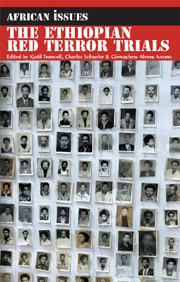Book contents
- Frontmatter
- Contents
- Notes on Contributors
- Preface
- Acknowledgements
- Abbreviations
- Glossary of Amharic Phrases
- 1 The ‘Red Terror’ Trials
- 2 The History of the Red Terror
- 3 The Rights of the Accused
- 4 The Role of the Special Prosecutor's Office
- 5 The Red Terror Trials versus Traditions of Restorative Justice in Ethiopia
- 6 A Quest for Justice or the Construction of Political Legitimacy?
- 7 Building State & Nation
- 8 Beyond the Red Terror Trials
- 9 Concluding the Main Red Terror Trial
- Index
Preface
Published online by Cambridge University Press: 12 September 2012
- Frontmatter
- Contents
- Notes on Contributors
- Preface
- Acknowledgements
- Abbreviations
- Glossary of Amharic Phrases
- 1 The ‘Red Terror’ Trials
- 2 The History of the Red Terror
- 3 The Rights of the Accused
- 4 The Role of the Special Prosecutor's Office
- 5 The Red Terror Trials versus Traditions of Restorative Justice in Ethiopia
- 6 A Quest for Justice or the Construction of Political Legitimacy?
- 7 Building State & Nation
- 8 Beyond the Red Terror Trials
- 9 Concluding the Main Red Terror Trial
- Index
Summary
Ethiopia's troubled past makes poignant inroads into the everyday life of its citizens. Experiences of state violence create torpidity long after the physical pain has disappeared; and the memories of lost ones linger for decades. Each individual confronts and tackles these occurrences differently, based on personal capacities and convictions. Coming to grips with the experience of massive human rights violation is not only an individual concern, but a collective endeavour. It is also a process fraught with political ambiguity. As such, the role of the state and its institutions is vital in accommodating both individual and collective claims within accountable procedures and frameworks.
The Derg military junta run by Col. Mengistu Hailemariam ruled Ethiopia from 1974 until 1991. It was, at that time, one of Africa's most brutal and authoritarian regimes. During what has been called the Red Terror from 1976 to 1978, tens of thousands of Ethiopian intellectuals, opposition party members and sympathizers were imprisoned, tortured and killed. The current Ethiopian government, the Ethiopian Peoples' Revolutionary Democratic Front (EPRDF), managed to topple the Derg by arms in May 1991, and in the process detained hundreds of officials from the Derg regime in order to make them accountable for the human rights atrocities conducted in the 1970s and 1980s.
In 1992 a Special Prosecutor's Office (SPO) was established and vested with the authority to investigate and institute proceedings against any person responsible for the commission of an offence by abusing his/her position under the Derg regime.
- Type
- Chapter
- Information
- The Ethiopian Red Terror TrialsTransitional Justice Challenged, pp. xi - xiiPublisher: Boydell & BrewerPrint publication year: 2009



